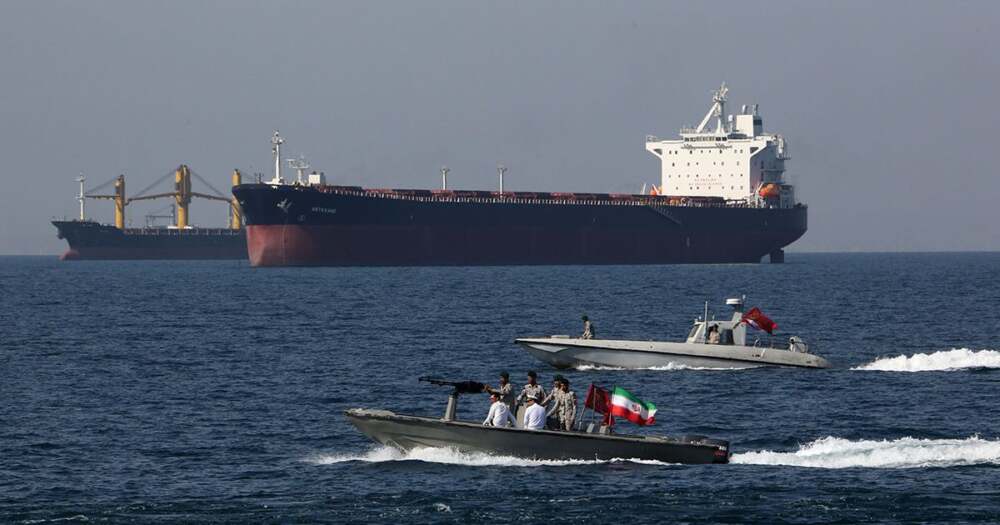In a significant maritime incident that has sent shockwaves through the Gulf and global shipping sectors, Iranian naval forces have reportedly intercepted a Marshall Islands‑flagged oil tanker en route from the United Arab Emirates to Singapore. The tanker, carrying a substantial quantity of crude oil, was diverted into Iranian territorial waters approximately 20 nautical miles east of the UAE port of Khor Fakkan, near the strategic Strait of Hormuz. The seizure has intensified regional security concerns and highlighted the vulnerability of global oil transport in one of the world’s most critical maritime corridors.
Details of the Seizure
Tracking data and maritime monitoring reports indicate that the vessel suddenly altered its course while navigating through the Gulf of Oman. According to commercial maritime sources, the tanker deviated sharply from its planned route and was subsequently brought under the control of Iranian forces. The crew’s condition and the precise status of the cargo have not yet been publicly disclosed, raising questions about the immediate implications for the vessel’s operators and insurers.
The Strait of Hormuz serves as a vital chokepoint through which roughly 20 percent of the world’s oil supply passes. Any disruption, whether temporary or prolonged, has historically had immediate consequences for energy markets, insurance costs, and shipping routes. Experts note that this incident, coming at a time of heightened geopolitical tension in the region, underscores the strategic significance of maritime control and the potential for economic disruption.
Regional and Strategic Context
Iran has increasingly demonstrated a willingness to assert its influence over critical maritime routes in the Gulf and the Arabian Sea. This seizure is widely seen as part of a broader strategy to project power and influence regional trade, particularly in the face of ongoing sanctions and diplomatic pressure from Western countries and neighboring states. Analysts suggest that Iran’s action may serve as both a demonstration of capability and a signal of its readiness to protect its interests in contested waters.
The UAE and other Gulf states have historically emphasized the security of shipping lanes as crucial to regional economic stability. This incident highlights the persistent vulnerabilities in maritime corridors that have traditionally been considered safe for international commerce. Regional observers warn that the seizure could prompt a reassessment of naval and maritime security strategies, potentially leading to increased patrols, escort missions, and enhanced surveillance along key shipping routes.
Economic Implications
The diversion of a large oil tanker has immediate implications for the global energy market. Disruptions in the flow of crude through the Strait of Hormuz often lead to volatility in oil prices, higher shipping and insurance premiums, and concerns over supply chain stability. Traders and energy companies are closely monitoring the situation, and analysts predict that even a short-term disruption could have ripple effects on global fuel markets.
In addition, the incident raises broader questions about the risk management strategies employed by shipping companies operating in high-risk waters. The vulnerability of vessels in the Gulf region has long been a point of concern, but recent events, including drone attacks and military maneuvers, underscore the complexity of operating in these contested spaces.
Diplomatic Repercussions
The seizure of the tanker is likely to trigger diplomatic discussions at multiple levels. The UAE, whose territorial waters were approached during the diversion, is expected to lodge formal protests and seek clarification from Iranian authorities. International maritime organizations may also become involved, advocating for the protection of commercial vessels and the maintenance of safe passage in the Gulf.
Furthermore, the incident could influence ongoing negotiations related to regional security, sanctions, and diplomatic relations between Iran and Gulf states. While the seizure does not immediately constitute an act of war, it represents a significant escalation that could affect broader geopolitical dynamics in the Middle East.
The Human Dimension
While the strategic and economic implications are clear, the human dimension of the incident is equally important. Crew members aboard the tanker face uncertainty regarding their safety, working conditions, and ability to continue their voyage. Maritime organizations and labor advocates emphasize the need for their protection and for clear communication regarding the status of the vessel and its cargo.
Potential Responses and Next Steps
Several potential responses are under consideration by regional authorities and international partners. These include:
- Increased naval patrols and escort operations to safeguard commercial shipping lanes.
- Heightened intelligence sharing among Gulf states and allied nations to monitor maritime activity.
- Diplomatic engagement aimed at resolving the immediate situation and preventing similar incidents in the future.
- Reassessment by shipping companies and insurers regarding risk exposure and contingency planning in the Gulf region.
Observers note that the speed and manner in which the situation is resolved will have a lasting impact on maritime security perceptions and the confidence of international traders in Gulf waters.
Implications for Global Energy Security
The Strait of Hormuz remains a linchpin of global energy security, and any disruption can have outsized effects on global markets. The seizure of this Singapore-bound tanker serves as a stark reminder that geopolitical tensions in the Gulf directly affect international commerce and energy stability. Governments, businesses, and investors will be closely monitoring Iran’s actions, regional responses, and the eventual release of the tanker to gauge the potential for further disruptions.
Conclusion
The interception of the oil tanker by Iranian forces highlights the fragility of critical maritime trade routes and the intersection of regional power projection, economic security, and global energy stability. While the immediate outcome for the vessel and its crew remains uncertain, the broader implications for regional security, global markets, and diplomatic relations are profound. The incident reinforces the importance of coordinated maritime security efforts and robust diplomatic engagement to ensure that commercial shipping remains safe and uninterrupted in one of the world’s most strategically vital waterways.
















Leave a Reply